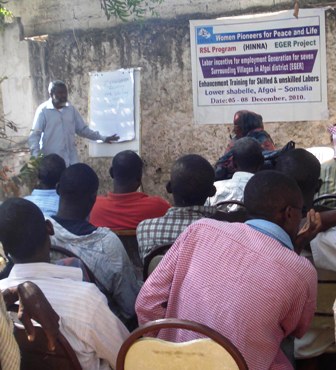 Executive Summary
Executive Summary
HINA conducted 4 day training workshop on community mobilization and sensitization towards sustainability and creation sense of ownership was held at “Afgoi village from 11-14 December ,2010, for community elders selected from the seven villages of project sites 7 from each ,as part of series of activities of canal rehabilitation of “EGER” project titled ”labor intensive employment generation for elders of seven villages in Afgoi district of lower Shebelle Region” HINNA has been undertaking with the overall objective to support the war and draught stricken vulnerable farmers in the above villages with regard to creation of jobs and increase of farm production.
The objectives of the training were;
• To enhance the awareness of community elders of the seven villages towards:
1. Community ownership in order to maintain project sustainability
2. The importance of their contributions either in cash and in kind
3. Dedication of their time ,putting forward guidelines or suggestions to smoothly run the project
• To acquire the knowledge and skills regarding mobilization of community towards maintaining the rehabilitated of repaired canals
• To motivate the elders on the importance of mobilization of villagers to participate in project sustainability implementation process
During the course the facilitator covered the following topics:
• Community mobilization comprising/methods of participation in project implementation and controlling after hand over
• Stakeholder analysis to identify the most influential stakeholder
• Formation of community committees across different villages for distribution of tools and water
• Problem solving techniques
• Village committees were discussed with the work plans of the canals’ maintenance. A work plan was developed with the community leaders to accommodate the needs of the community by prioritizing the sequence of the maintenance and rehabilitation of the canals. This was to identify which canal is to be maintained first and which one comes next. In doing so, some farmers were allowed by the village leaders to continue irrigation with the small amount of water from the silted canals while other canals were being rehabilitated.
• Full Participation in the Monitoring & Evaluation of Project Activities
Action Plans
• Pass knowledge and skills acquired to the rest of village community for increasing the awareness towards sustainablity
• Launch mobilization campaigns of village community towards importance rehabilitation of canals
• Explain the meaning of ownership for villagers and its importance for project sustainability
• Seek funds for other projects regarding farming systems
• Form committees for water &tools distribution and rehabilitation activities

